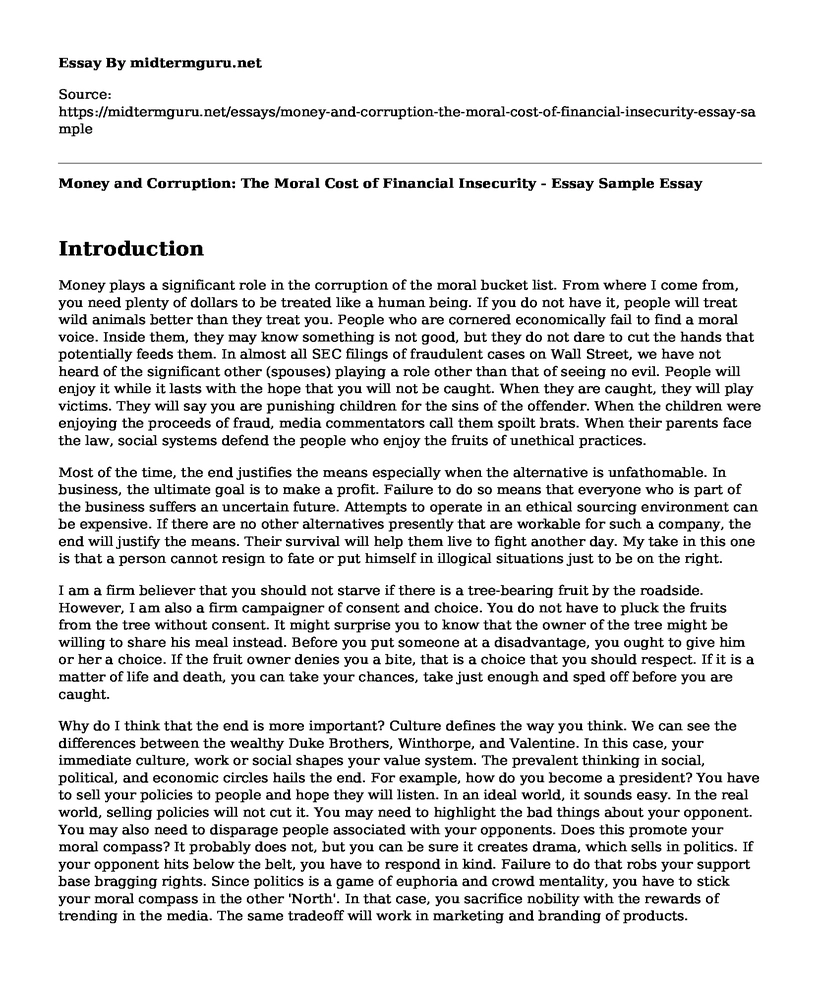Introduction
Money plays a significant role in the corruption of the moral bucket list. From where I come from, you need plenty of dollars to be treated like a human being. If you do not have it, people will treat wild animals better than they treat you. People who are cornered economically fail to find a moral voice. Inside them, they may know something is not good, but they do not dare to cut the hands that potentially feeds them. In almost all SEC filings of fraudulent cases on Wall Street, we have not heard of the significant other (spouses) playing a role other than that of seeing no evil. People will enjoy it while it lasts with the hope that you will not be caught. When they are caught, they will play victims. They will say you are punishing children for the sins of the offender. When the children were enjoying the proceeds of fraud, media commentators call them spoilt brats. When their parents face the law, social systems defend the people who enjoy the fruits of unethical practices.
Most of the time, the end justifies the means especially when the alternative is unfathomable. In business, the ultimate goal is to make a profit. Failure to do so means that everyone who is part of the business suffers an uncertain future. Attempts to operate in an ethical sourcing environment can be expensive. If there are no other alternatives presently that are workable for such a company, the end will justify the means. Their survival will help them live to fight another day. My take in this one is that a person cannot resign to fate or put himself in illogical situations just to be on the right.
I am a firm believer that you should not starve if there is a tree-bearing fruit by the roadside. However, I am also a firm campaigner of consent and choice. You do not have to pluck the fruits from the tree without consent. It might surprise you to know that the owner of the tree might be willing to share his meal instead. Before you put someone at a disadvantage, you ought to give him or her a choice. If the fruit owner denies you a bite, that is a choice that you should respect. If it is a matter of life and death, you can take your chances, take just enough and sped off before you are caught.
Why do I think that the end is more important? Culture defines the way you think. We can see the differences between the wealthy Duke Brothers, Winthorpe, and Valentine. In this case, your immediate culture, work or social shapes your value system. The prevalent thinking in social, political, and economic circles hails the end. For example, how do you become a president? You have to sell your policies to people and hope they will listen. In an ideal world, it sounds easy. In the real world, selling policies will not cut it. You may need to highlight the bad things about your opponent. You may also need to disparage people associated with your opponents. Does this promote your moral compass? It probably does not, but you can be sure it creates drama, which sells in politics. If your opponent hits below the belt, you have to respond in kind. Failure to do that robs your support base bragging rights. Since politics is a game of euphoria and crowd mentality, you have to stick your moral compass in the other 'North'. In that case, you sacrifice nobility with the rewards of trending in the media. The same tradeoff will work in marketing and branding of products.
For every new perspective you get in life, it affects how you process future experiences and situations. Every person has a core moral self that one identifies with privately and publicly. Events in life shape it for the better or worse. Striving to grow to be better should be on your moral bucket list. It should help you find the moral identity that permeates positivity throughout humanity.
During this semester, I have learned several things about myself that I did not know. I have tried to go back through history with the hope that I can identify myself in different historical times. My moral fabric is like a free yarn that I can use to make whatever I want. How hard I think about the affairs of others may change in different situations. However, your imagination is limited by the existence of a world of systems around. When you think of business, you start looking at it as a product of taxation, subject to rules and regulation of a country, and such things. I thought that moral compass radiates throughout every society only to find that it has a degree of relativism in it.
References
Russo, A (Producer) &. Landis, J. (Director), (1983). Trading Places. [Motion picture]. United States: Paramount Pictures.
Cite this page
Money and Corruption: The Moral Cost of Financial Insecurity - Essay Sample. (2023, Jan 01). Retrieved from https://midtermguru.com/essays/money-and-corruption-the-moral-cost-of-financial-insecurity-essay-sample
If you are the original author of this essay and no longer wish to have it published on the midtermguru.com website, please click below to request its removal:
- Annotated Bibliography on Institutional Policy - Paper Example
- Annotated Bibliography: The Illegality of Marijuana
- Paper Example on Fight for Equality
- Rise of Synthetic Drug Abuse: The Growing Threat of Bath Salts - Essay Sample
- Eliminating Poverty: Unlocking Social Issues Through Charities & Philanthropy - Essay Sample
- Women, Abortion, and Social Inequity - Essay Sample
- Influence of Gender Inequality on Domestic Violence in the Connection to the Susan Glaspell "A Jury of Her Peers"







